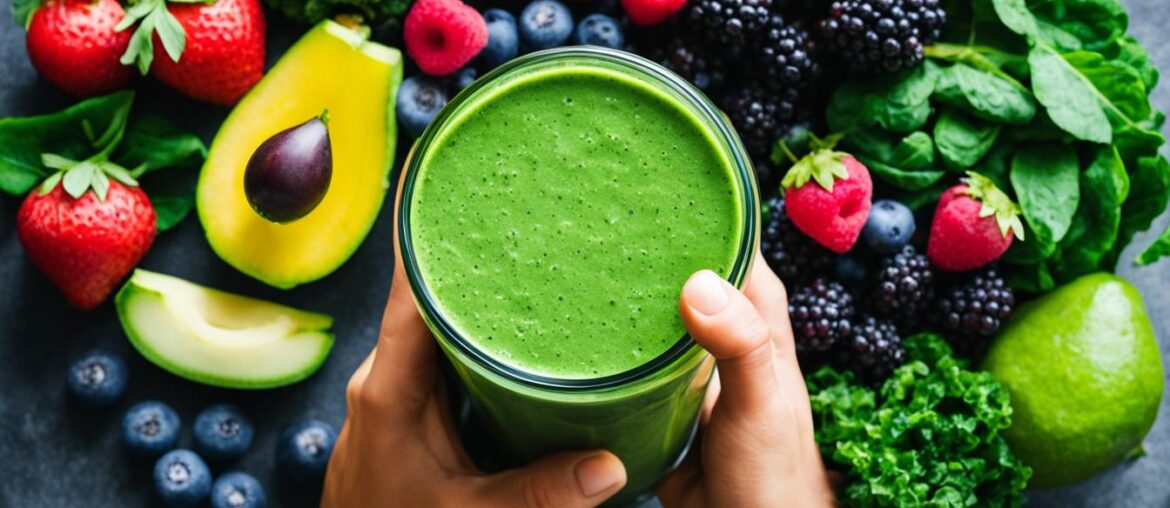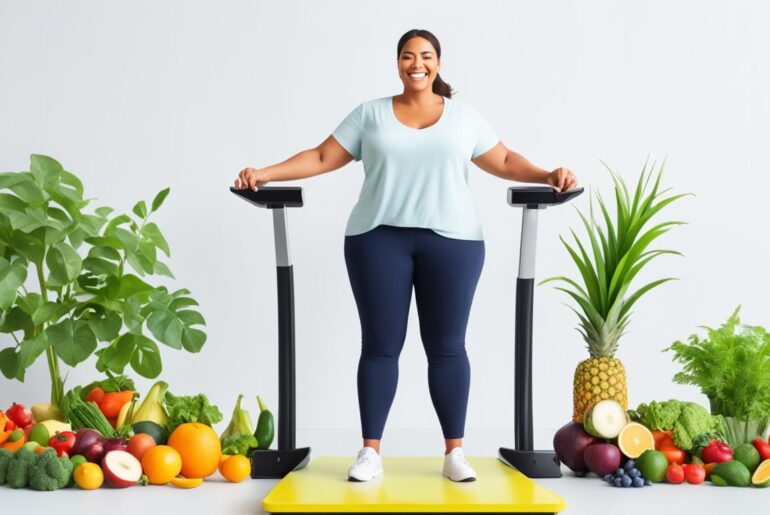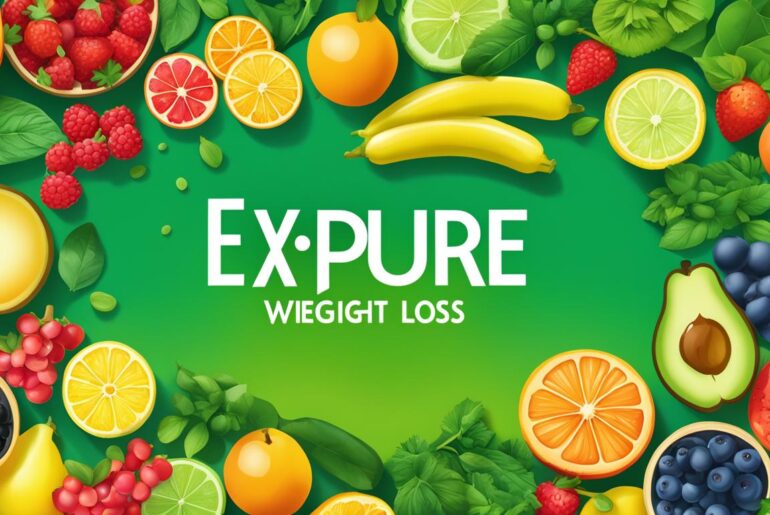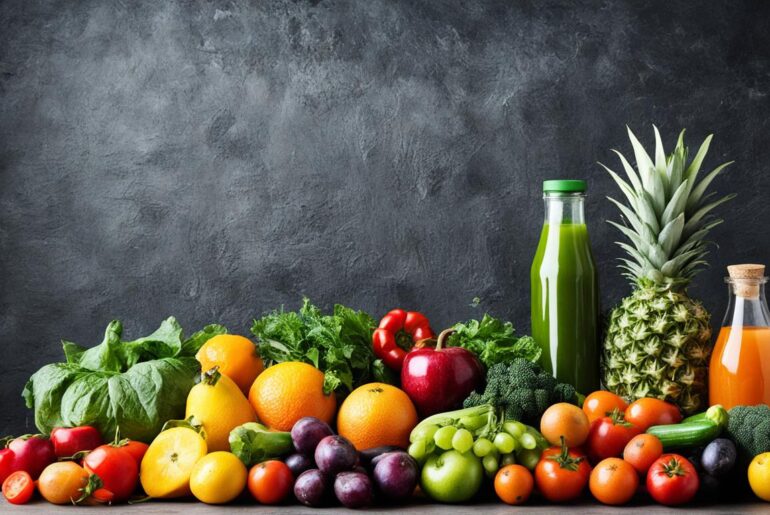Detox cleanses have gained popularity as a way to reset the body and promote overall health. When it comes to choosing the best detox cleanses, it’s important to prioritize effectiveness and natural ingredients (see my post here). There are several options available, including juice cleanses, smoothie or soup-based cleanses, and liquid cleanses using tea or lemon water. However, it’s crucial to consult with a healthcare professional before starting any detox cleanse program.
While these cleanses can provide temporary benefits, it’s important to be aware that they may lack essential nutrients and be low in calories. This emphasizes the need for a well-balanced approach to detoxification. Let’s explore the pros, cons, and natural alternatives to juice cleanses, as well as dispel some misconceptions about detox diets.
Key Takeaways
- Choose detox cleanses that are effective and utilize natural ingredients.
- Consult with a healthcare professional before starting a detox cleanse program.
- Juice cleanses may be low in important nutrients and calories.
- Smoothie or soup-based cleanses provide a more balanced nutritional profile.
- Various liquid cleanses, such as tea or lemon water, may offer potential health benefits.
Pros and Cons of Juice Cleanses
Juice cleanses have become a popular choice for detoxification, where only the extract squeezed from fruits and vegetables is consumed. While these cleanses are marketed as providing all the necessary nutrition and giving the digestive system a break, there are pros and cons to consider.
According to nutrition experts, juice cleanses have several benefits. Fresh juices contain immune-boosting antioxidants like vitamin C, which can help support overall health. They are also rich in vitamins, minerals, and phytonutrients that can nourish the body. Additionally, the high water content of juices can help hydrate the body and flush out toxins.
However, there are drawbacks to juice cleanses as well. One major concern is that they often lack essential nutrients like protein, fiber, fat, and calories, which are necessary for the body’s proper functioning. This can create nutritional imbalances and make it difficult to meet the body’s daily needs.
Juice cleanses can also be high in sugar and have a high glycemic index, which can lead to hunger, fatigue, and potential malnutrition if followed for an extended period. The high sugar content in juices can cause blood sugar spikes and crashes, affecting energy levels and overall well-being.
Moreover, while juice cleanses offer short-term benefits, they may not be a sustainable way to eat for the long term. As they primarily consist of liquid extracts, they lack the satiety and satisfaction that comes from consuming whole fruits and vegetables. This can result in cravings and a higher likelihood of returning to unhealthy eating habits once the cleanse is over.
It’s important to approach juice cleanses with caution and moderation. They can be a useful tool for a short-term detox and jump-starting a healthier lifestyle. However, it’s crucial to ensure that the cleanse is well-balanced and supplemented with other sources of nutrition to avoid potential negative effects on the body.
While juice cleanses provide a boost of nutrients and hydration, they may not meet the body’s daily nutritional needs. It’s important to consult with a healthcare professional before embarking on a juice cleanse or any detox cleanse program to ensure it is safe and suitable for individual health goals.
To summarize the pros and cons of juice cleanses:
| Pros | Cons |
|---|---|
| Providing essential nutrients and hydration | Lacking protein, fiber, fat, and calories |
| Rich in immune-boosting antioxidants | High in sugar and glycemic index |
| Aiding in detoxification and hydration | Lacking satiety and long-term sustainability |
Natural Alternatives to Juice Cleanses
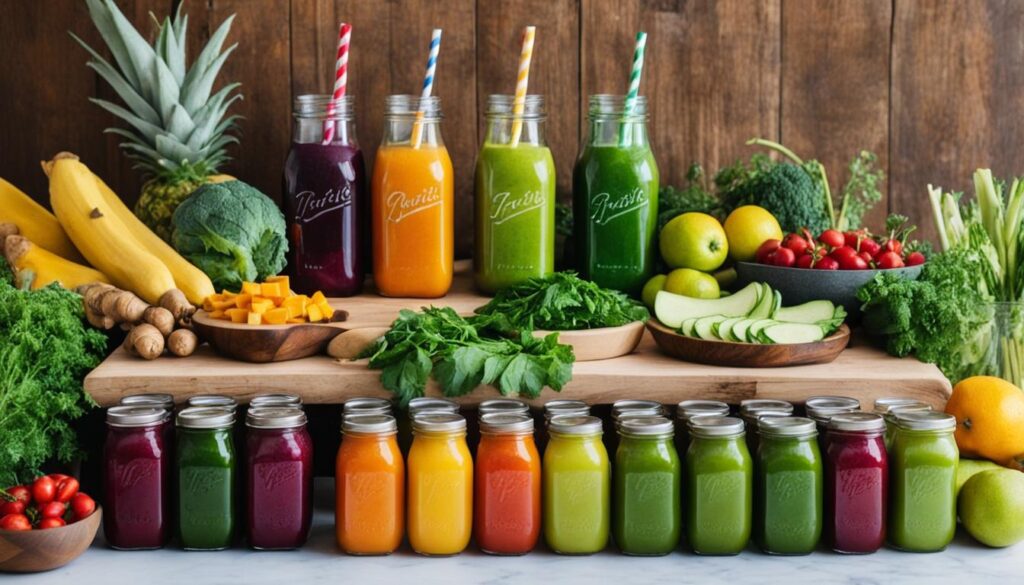
For those looking for a more sustainable detox cleanse option, smoothie or soup-based cleanses may be a better choice. These cleanses often incorporate more protein and fiber from whole blended fruits, nuts, or protein powder, providing a more balanced nutritional profile. They can offer similar benefits to juice cleanses but with added satiety and a reduced glycemic index.
Research suggests that smoothie-based cleanses can be an effective way to support the body’s natural detoxification process while providing a satisfying and nourishing experience.
Other popular liquid cleanses use brewed tea, apple cider vinegar, or lemon water as their main detoxifying ingredient. While some research suggests potential health benefits, it’s important to note that no single liquid can be considered a magic bullet for detoxification. Water still remains the best liquid for flushing toxins out of the system.
For a better understanding, here is a table that compares the nutritional profiles of juice cleanses and smoothie-based cleanses:
| Cleansing Method | Pros | Cons |
|---|---|---|
| Juice Cleanse | – Provides a concentrated dose of vitamins and antioxidants – Gives the digestive system a break |
– Lack of protein, fiber, fat, and calories – High sugar content and glycemic index – Potential hunger, fatigue, and malnutrition if followed long-term |
| Smoothie-based Cleanse | – More balanced nutritional profile with protein and fiber – Greater satiety – Reduced glycemic index |
– May require preparation and blending time – Could be less convenient for on-the-go individuals |
While both juice cleanses and smoothie-based cleanses have their own advantages and disadvantages, it’s essential to choose a detox cleanse method that aligns with your goals, preferences, and lifestyle. Consulting with a healthcare professional can help you make an informed decision and customize a detox cleanse program that suits your individual needs.
The Truth About Detox Diets
Detox diets, often marketed as a way to eliminate toxins and promote weight loss, are surrounded by many misconceptions. These diets typically involve the use of special products or diets that claim to rid the body of toxins. However, the truth is that the body has its own natural detoxification system, which includes the liver, kidneys, digestive system, skin, and lungs.
While detox diets may provide temporary benefits, there is no scientific evidence to support their effectiveness in eliminating toxins or promoting sustainable weight loss. The concept of a full-body detox is often exaggerated, leading to unrealistic expectations and disappointment.
“Detox diets are often seen as a quick fix, but they rarely live up to the hype,” says Dr. Emily Miller, a renowned nutrition expert. “The body’s natural detoxification system is highly efficient, and it doesn’t require any special diets or products.”
It’s important to focus on supporting the body’s natural detoxification processes through healthy lifestyle choices rather than relying on detox cleanse programs. Here are some misconceptions about detoxing that need to be debunked:
- Misconception: Detox diets are necessary to eliminate toxins. The body is equipped with organs and systems that are designed to naturally eliminate toxins. The liver, for example, plays a central role in detoxification by filtering and breaking down harmful substances. Detox diets often claim to enhance the body’s natural detox process, but they are unnecessary and may even disrupt this delicate balance.
- Misconception: Detox diets lead to sustainable weight loss. While it’s true that some detox diets may result in temporary weight loss, this is often due to water loss and calorie restriction rather than fat loss. Once normal eating patterns are resumed, the weight is likely to return. Sustainable weight loss comes from making long-term changes to your eating habits and lifestyle.
- Misconception: Detox diets are the only way to achieve a full-body detox. The term “full-body detox” is often misleading. The body’s natural detoxification system is comprehensive and includes multiple organs and systems working together. While certain foods and lifestyle choices can support these processes, there is no single detox diet or program that can achieve a complete detoxification of the entire body.
“It’s important to approach detoxing with a realistic mindset,” advises Dr. Miller. “Focus on adopting a balanced, nutritious diet with plenty of fruits, vegetables, whole grains, and lean proteins.”
Supporting the body’s natural detoxification processes doesn’t require extreme measures. Simple lifestyle choices such as limiting alcohol, getting adequate sleep, drinking plenty of water, reducing sugar and processed food intake, eating antioxidant-rich foods, and promoting gut health with prebiotics can go a long way in maintaining a healthy body and supporting its natural detoxification mechanisms.
Conclusion
In conclusion, when embarking on a detox cleanse for a healthy reset, it’s essential to choose effective and natural detox cleanses. While juice cleanses are popular, they may lack essential nutrients and be low in calories. Instead, consider smoothie or soup-based cleanses that offer a more balanced nutritional profile. You can also explore various liquid cleanses, such as those using tea or lemon water, which provide potential health benefits.
However, it is important to remember that the body has its own natural detoxification system. Detox diets are not necessary to eliminate toxins. You can support your body’s natural detoxification processes by making healthy lifestyle choices. Limit alcohol consumption, get enough sleep, and consume antioxidant-rich foods to promote overall health and well-being.
By selecting top detox cleanses that are effective and natural, and by incorporating healthy habits into your daily routine, you can achieve a holistic approach to detoxification and maintain a balanced and healthy lifestyle (see my post here).

